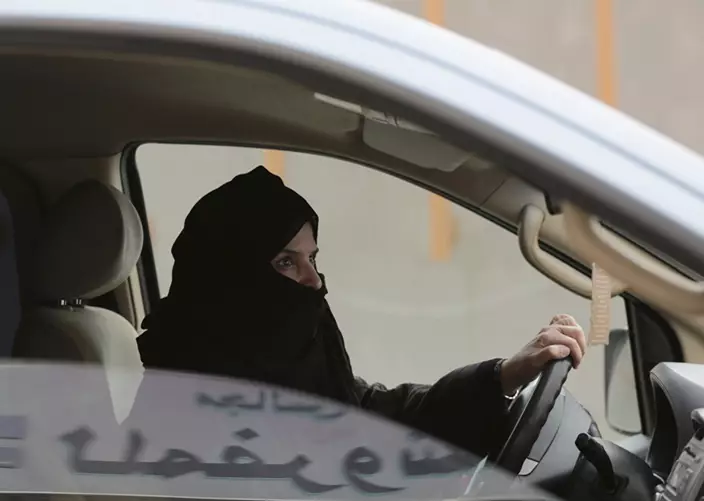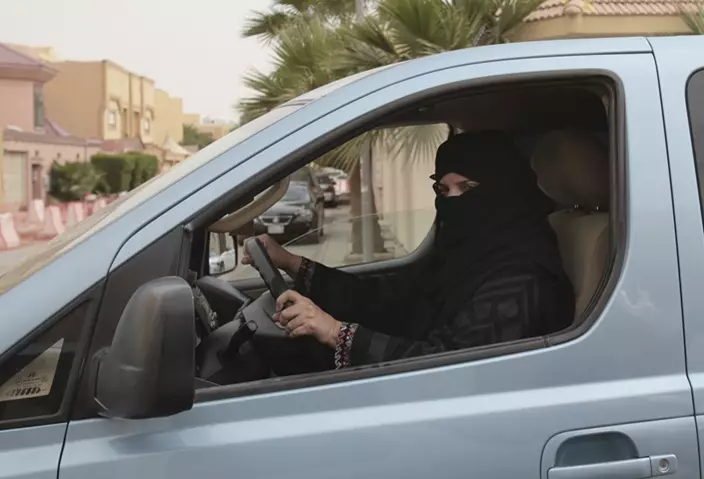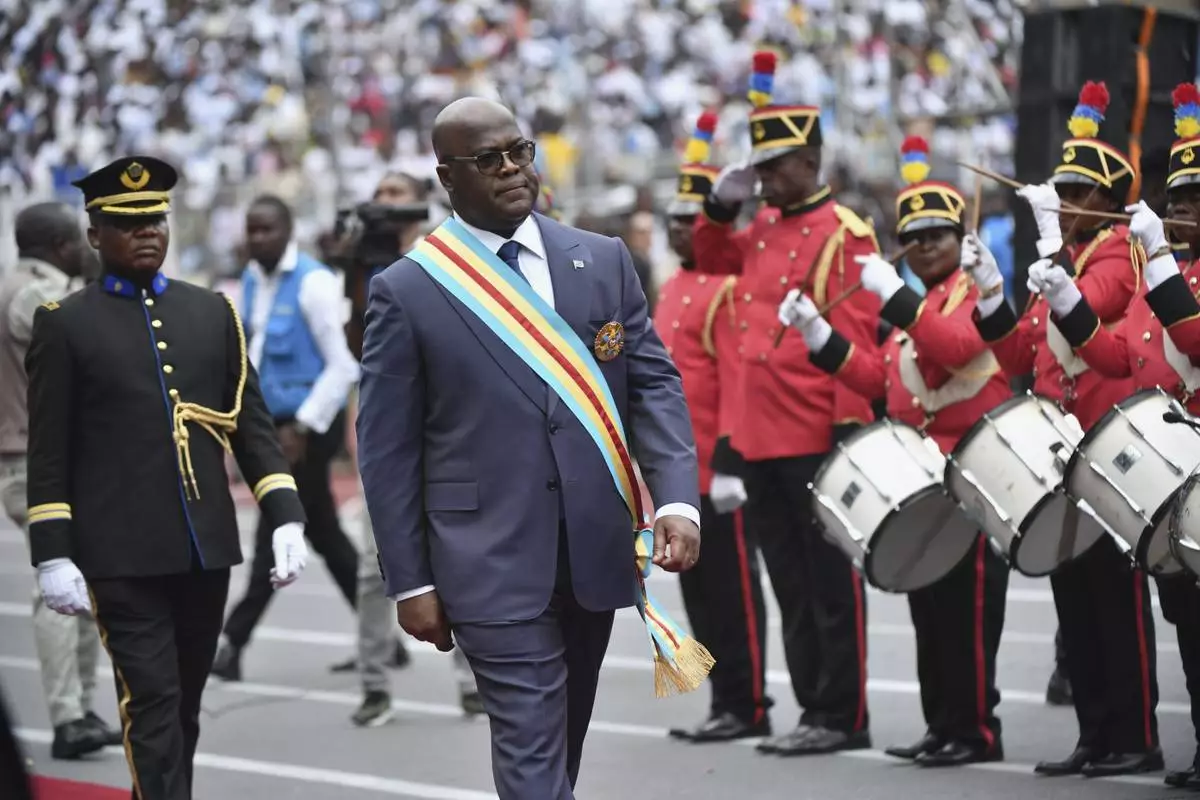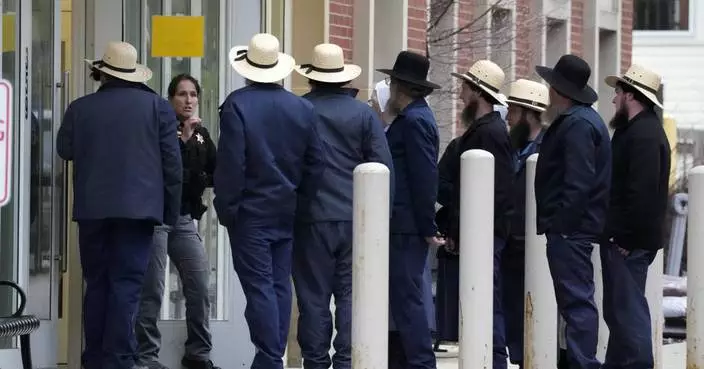Women will be allowed to drive for the first time next summer in Saudi Arabia, the ultra-conservative kingdom announced Tuesday, marking a significant expansion of women's rights in the only the country that barred them from getting behind the wheel.

FILE - In this Saturday, March 29, 2014 file photo, Aziza Yousef drives a car on a highway in Riyadh, Saudi Arabia, as part of a campaign to defy Saudi Arabia's ban on women driving. (AP Photo/Hasan Jamali, File)
While women in other Muslim countries drove freely, the kingdom's blanket ban attracted negative publicity for years. Neither Islamic law nor Saudi traffic law explicitly prohibited women from driving, but they were not issued licenses and were detained if they attempted to drive.
Prince Khaled bin Salman, Saudi Arabia's ambassador to Washington and the king's son, said letting women drive is a "huge step forward" and that "society is ready."
"This is the right time to do the right thing," he told reporters in the U.S. Women will be allowed to obtain licenses without the permission of a male relative.
The announcement came in the form of a royal decree that was reported late Tuesday by the state-run Saudi Press Agency and state TV.

FILE- In this Saturday, March 29, 2014 file photo, a woman drives a car in Riyadh, Saudi Arabia, as part of a campaign to defy Saudi Arabia's ban on women driving. Saudi Arabia authorities announced Tuesday Sept. 26, 2017, that women will be allowed to drive for the first time in the ultra-conservative kingdom from next summer, fulfilling a key demand of women's rights activists who faced detention for defying the ban. (AP Photo/Hasan Jamali, FILE)
"I am really excited. This is a good step forward for women's rights," said Aziza Youssef, a professor at King Saud University and one of Saudi Arabia's most vocal women's rights activists. Speaking to The Associated Press from Riyadh, she said women were "happy" but also that the change was "the first step in a lot of rights we are waiting for."
Saudi history offers many examples of women being punished simply for operating a vehicle.
In 1990, 50 women were arrested for driving and lost their passports and their jobs. More than 20 years later, a woman was sentenced in 2011 to 10 lashes for driving, though the late King Abdullah overturned the sentence.
As recently as late 2014, two Saudi women were detained for more than two months for defying the ban on driving when one of them attempted to cross the Saudi border with a license from neighboring United Arab Emirates in an act of defiance.
Youssef took part in numerous driving campaigns, including a widely publicized effort in 2013 when dozens of women across the kingdom uploaded videos to YouTube of themselves driving in Saudi Arabia. Some videos showed families and male drivers giving women a "thumbs-ups," suggesting many were ready for the change.
The decree indicated that women will not be allowed to drive immediately. A committee will be formed to look into how to implement the new order, which is slated to take effect in June 2018.
For years, the kingdom has incrementally granted women more rights and visibility, including participation in the Olympic Games in London and Rio, positions on the country's top consultative council and the right to run and vote in local elections in 2015.
Despite these openings, Saudi women remain largely subject to the whims of men due to guardianship laws , which bar them from obtaining a passport, traveling abroad or marrying without the consent of a male relative. Women who attempt to flee abusive families have also faced imprisonment or been forced into shelters.
King Salman and his young son and heir, Crown Prince Mohammed bin Salman, tested the waters over the weekend by allowing women into the country's main stadium in Riyadh for annual celebrations of the nation's founding. The stadium had previously been reserved for all-male crowds to watch sporting events.
Women and men also flooded a main street in the capital, bopping their heads to pop music as green lights flickered overhead in the color of the flag. The scene was shocking for a city in which gender segregation is strictly enforced and where women are seldom seen walking the streets, much less mixing in close quarters with males.
The 32-year-old crown prince has also opened the country to more entertainment , allowing musical concerts and even a Comic-Con event as part of a wide-ranging push to reform the economy and society. This year, the government announced that for the first time girls in public schools would be allowed to play sports and have access to physical education.
The decree stated that the majority of Muslim scholars on the country's highest clerical council agreed that Islam allows women the right to drive.
However, many of those same ultraconservative clerics, who wield power and influence in the judiciary and education sectors, have also spoken out in the past against women driving, playing sports or entering the workforce. They argue such acts corrupt society and lead to sin.
One Saudi cleric even stated in 2013 that driving could affect a woman's ovaries and hurt her fertility. That same year, around 150 clerics and religious scholars held a rare protest outside the Saudi king's palace against efforts by women seeking the right to drive.
Women in Saudi Arabia have long had to rely on male relatives to get to work or run errands, complicating government efforts to boost household incomes as lower oil prices force austerity measures. The more affluent have male drivers. In major cities, women can access ride-hailing apps such as Uber and Careem.
To celebrate Tuesday's decree, several Saudi women posted images on social media deleting their ride sharing apps.
President Donald Trump commended the order in a White House press office statement that called the change "a positive step toward promoting the rights and opportunities of women in Saudi Arabia." U.S. State Department spokeswoman Heather Nauert called the move "a great step in the right direction." She did not comment on whether Saudi Arabia still needs to do more to ensure full rights for its female citizens.
Lori Boghardt, a Gulf specialist at the Washington Institute for Near East Policy, said the change is yet another sign that the crown prince is intent on adopting social reforms that will transform the kingdom.
"Today it's especially clear that this includes moves that've long been thought of by Saudis as politically risky," she said.





